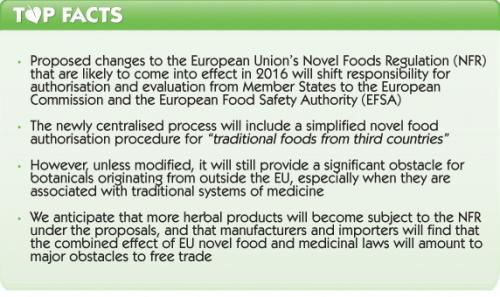Content Sections
Adam Smith, science & communications officer, ANH-Intl
Rob Verkerk PhD, executive & scientific director, ANH-Intl
Throwing the toys out of the pram
Among the ‘big 5’ pieces of European Union (EU) legislation that threaten natural healthcare – the others being the EU Medicines Code (Directive 2001/83/EC, as amended), the Traditional Herbal Medicinal Products Directive (THMPD; Directive 2004/24/EC), the Food Supplements Directive (FSD; Directive 2002/46/EC, as amended) and the Nutrition and Health Claims Regulation (NHCR; No. 1924/2006) – the Novel Foods Regulation (NFR; No. 258/97, as amended) is like the annoying little brother.

Most of the time, it keeps out of the way and minds its own business, letting its rowdier siblings get on with the business of making life difficult for natural health products, manufacturers, retailers, practitioners and users. Every now and again, however, a product – usually a herbal product originating from a non-European country – catches its attention and it throws a tantrum. The only way the manufacturer can then calm the little ‘darling’ is either to prove that its product was consumed “to a significant degree” (and that’s open to wide interpretation) in the EU prior to 15th May 1997, or negotiate the obstacle course set up by the NFR and successfully win an EU novel food authorisation. Results of deliberations by the Member State competent authorities are reflected in the Novel Food Catalogue. Because the definition of a novel food is so wide, the NFR has been having a disproportionate effect, especially on food supplements containing botanical ingredients that were not consumed within the EU significantly prior to May 1997 – irrespective of whether these were commonly consumed outside the EU.
Remodelling the Novel Foods Regulation
Citing a need to “streamlin[e] the approval process,” for novel foods, the European Commission (EC) began discussions in 2009 on updating the NFR. Five years later, the proposals are finally on the table, but it’s been a bumpy ride: negotiations broke down completely in 2011 after EU Member States and the European Parliament failed to agree on issues linked to animal cloning – which has been shunted off into separate legislation.
The changes: Centralisation, more bureaucracy and EFSA-ing
So, assuming the proposed legislation doesn’t change significantly before becoming law, what will the revised NFR mean for natural product manufacturers?
- The new NFR will centralise the entire assessment and authorisation process. Instead of the existing assessments by individual EU Member State competent authorities, all applications will need to be submitted centrally, to the EC. The EC may then “request a scientific opinion of risk assessment from the European Food Safety Authority (EFSA)”
- Food business operators will be responsible for assessing whether their products are suitable for the novel foods application process, assisted by Member State competent authorities
- A central ‘Union list’ of authorised novel foods will be created (Article 5)
- Genetically modified (GM) products, enzymes, food additives and flavourings and animal clones are all excluded from the new scheme
- Article 2 contains the crucial definitions. The broad definition of a novel food is unchanged, and has been expanded to include “engineered nanomaterials”
- A simplified, supposedly fast-track, authorisation procedure is introduced for traditional foods from third countries where a safe history of use of 25 years can be demonstrated. This will need to be confirmed “with compositional data and from experience of continued use for at least 25 years in the customary diet of a large part of the population of a third country” (Article 2(c)) – something that is easier said than done
- Food supplements come in for special attention in Article 2. For the first time, they become a named category of novel food, and the new NFR makes it clear that substances used exclusively in food supplements prior to 15th May 1997 will be considered as novel foods for anything other than food supplement use
- Applicants will have to provide scientific evidence to the EC that the proposed novel food poses no “safety risk to human health”, and the EC “may” ask EFSA for its opinion
- The EC will approve a new novel food if it: i) does not pose a risk to public health; ii) “its use does not mislead the consumer”; and iii) “where it is intended to replace another food, it does not differ from that food in such a way that its normal consumption would be nutritionally disadvantageous” (Article 6)
- To protect commercial investment, scientific information developed in support of a successful novel food application may not be used by another company within 5 years of the ‘Community list’ being updated.
The bottom line
Certain aspects of these proposals are, frankly, worrying. We’ve written extensively about EFSA’s inadequacies, and we can see little positive about it being given a central role in the novel foods authorisation process. Some of the clauses in the proposed Regulation are very strange: how can use of a product be misleading, for example, and who determines what constitutes “nutritionally disadvantageous”? EFSA? The EC? Bearing in mind the disastrous results of the duo’s work on the NHCR, we shudder to imagine the consequences for novel foods.
We also anticipate that the phenomenon of herbal products being hoovered up by the NFR will accelerate. In certain EU Member States, most notably Belgium, this is already happening; the existing NFR poses the single biggest obstacle to the sale of herbs associated with non-European systems of traditional medicine. This is likely to be caused by the expanded definitions contained in Article 2, made more acute by the existence of the “traditional foods from third countries” provisions.
When it comes to herbs of non-European origin used for healthcare, the following is a plausible, and uncomfortable, scenario of the combined effect of the revised NFR and existing medicines, food and food supplements laws in the EU:
- Many will continue to be ineligible for the THMPD, as they will not have been available on the EU market for at least 15 years
- Many will be ineligible for the FSD, because Member State competent authorities consider them as medicinal owing to their efficacy and consider the THMPD as the rightful regime for such herbal products
- No health claims will be allowed for them, as EFSA is unlikely to agree that cause and effect relationships have been established form the data it has available
- Many will have a very tough time being approved as novel foods, given the obstacles within the proposed simplified authorisation system for traditional foods from third countries. Much will likely hinge on evidence of use in the “customary diet” of the third country
- Just for good measure, Recital 14 of the proposals confirms the primacy of EU medicinal law over the NFR – so if a product could be classified as either a medicine or a novel food, the regulator is at liberty to use the permanently loaded gun of EU medicines law to declare it a medicine.
Please await a call to action
The new NFR proposals are unlikely to become law until 2016, and we will keep you informed of any changes along the way. Once the new European Parliament is assembled, we will launch a lobbying campaign targeted at both the European Parliament and individual EU Member States. Even minor changes to the text of the existing proposal could significantly reduce regulatory burdens – and this is what we, and others, will be hoping to achieve. But for this to be most effective, your support and involvement will be invaluable. We will keep you posted.








Comments
your voice counts
19 March 2014 at 9:30 pm
C'est tout simplement de la folie ,du délire ,ils ne voient pas qu'ils sont pire que Hitler : Ils ne veulent pas se suicider tout seuls ,c'est l'espèce humaine qu'ils veulent éliminer ;ils sont en train de changer l'ADN de la terre tout ce que la nature a fait est en modification . Regarder ce qui se passe aux USA ,c'est aux organismes régulateurs que l'on doit cette catastrophe de la santé .Pourquoi? Parce que il n'y a pas de responsables .Demandons une loi qui oblige les décideurs à signer chaque règlement avec lequel ils sont d'accord ,et, si il y a des morts ou des maladies suite à ces décisions, qu'ils soient jugés pour le crime qu'ils ont commis . Qui va payer pour toutes ces maladies; pour tous ces morts en augmentation constante ? Et par dessus tout ,bannir ceux qui se laissent corrompre ,et blessent leurs semblables sans un gramme de conscience .Dans cinquante ans on ne pourra pas en parler .LA DESTRUCTION GENERALISEE EST EN MARCHE .
22 January 2015 at 10:44 am
Can you keep me informed about ongoing negotiations in this area, please?
22 January 2015 at 4:18 pm
Any developments within this area will be included in our weekly e-Alert. If you're not already signed up to receive it, you can do so by simply entering your email address in the green box on the right hand side of our website.
Your voice counts
We welcome your comments and are very interested in your point of view, but we ask that you keep them relevant to the article, that they be civil and without commercial links. All comments are moderated prior to being published. We reserve the right to edit or not publish comments that we consider abusive or offensive.
There is extra content here from a third party provider. You will be unable to see this content unless you agree to allow Content Cookies. Cookie Preferences